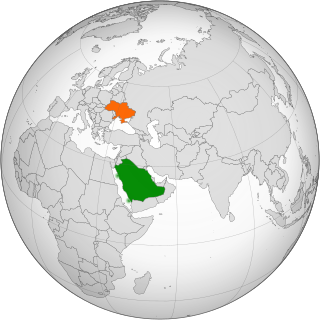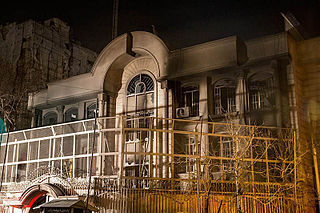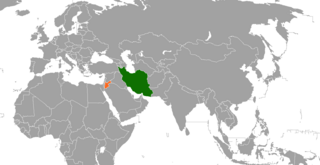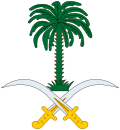
Foreign relations of Saudi Arabia are the diplomatic and trade relations between Saudi Arabia and other countries around the world. The foreign policy of Saudi Arabia is focused on co-operation with the oil-exporting Gulf States, the unity of the Arab World, Islamic solidarity, and support for the United Nations. In practice, the main concerns in recent years have been relations with the US, the Saudi Arabian–led intervention in Yemen, the Israeli–Palestinian conflict, Iraq, the perceived threat from the Islamic Republic of Iran, and the effect of oil pricing. Saudi Arabia contributes large amounts of development aid to Muslim countries. From 1986 to 2006, the country donated £49 billion in aid.

Fahd bin Abdulaziz Al Saud was King and Prime Minister of Saudi Arabia from 13 June 1982 until his death in 2005. Prior to his ascension, he was Crown Prince of Saudi Arabia from 1975 to 1982. He was the eighth son of King Abdulaziz, the founder of modern Saudi Arabia.

Khalid bin Abdulaziz Al Saud was a Saudi Arabian statesman and politician who served as King and Prime Minister of Saudi Arabia from 25 March 1975 to his death in 1982. Prior to his ascension, he was Crown Prince of Saudi Arabia from 29 March 1965 to 25 March 1975. He was the fifth son of King Abdulaziz, the founder of modern Saudi Arabia.

Saud bin Faisal Al Saud, also known as Saud Al Faisal, was a Saudi Arabian statesman and diplomat who served as the foreign minister of Saudi Arabia from 1975 to 2015. A member of the Saudi royal family, he was the longest-serving foreign minister in world history.

Adel Al-Jubeir is a Saudi diplomat who is the Minister of State for Foreign Affairs. He is the second person not belonging to the House of Saud to hold the office, after Ibrahim bin Abdullah Al Suwaiyel. He previously served as the Saudi Ambassador to the United States from 2007 to 2015, and was also a foreign policy advisor to King Abdullah.

Salman bin Abdulaziz Al Saud is King of Saudi Arabia, reigning since 2015 and had previously served as Prime Minister of Saudi Arabia from 2015 to 2022. The 25th son of King Abdulaziz, the founder of Saudi Arabia, he assumed the throne on 23 January 2015. Prior to his accession, he was Crown Prince of Saudi Arabia from 18 June 2012 to 23 January 2015. Salman is the third oldest living head of state, the oldest living monarch, and Saudi Arabia's first head of state born after the unification of Saudi Arabia. He has a reported personal wealth of at least $18 billion, which makes him the third wealthiest royal in the world and one of the wealthiest individuals in the world.

The Emirate of Nejd or Imamate of Nejd was the Second Saudi State, existing between 1824 and 1891 in Nejd, the regions of Riyadh and Ha'il of what is now Saudi Arabia. Saudi rule was restored to central and eastern Arabia after the Emirate of Diriyah, the First Saudi State, having previously been brought down by the Ottoman Empire's Egypt Eyalet in the Ottoman–Wahhabi War (1811–1818).

Russia–Saudi Arabia relations are the bilateral relations between Russian Federation and Kingdom of Saudi Arabia. The two countries are referred to as the two petroleum superpowers and account for about a quarter of the world's crude oil production between them.

Abdullah bin Abdulaziz Al Saud was King and Prime Minister of Saudi Arabia from 1 August 2005 until his death in 2015. Prior to his ascension, he was Crown Prince of Saudi Arabia since 13 June 1982. He was the tenth son of King Abdulaziz, the founder of Saudi Arabia.

Bilateral relations between Iran and Saudi Arabia have been strained over several geopolitical issues, such as aspirations for regional leadership, oil export policy and relations with the United States and other Western countries. Diplomatic relations were suspended from 1987 to 1990, and in 2016 for seven years following certain issues like the intervention in Yemen, Iran embassy bombing in Yemen, incidents in 2015 Hajj, the execution of Nimr al-Nimr, the attack on the Saudi diplomatic missions in Iran. However, in March 2023, after discussions brokered by China, Iran and Saudi Arabia agreed to reestablish relations.

Saudi Arabia–Ukraine relations are foreign relations between Saudi Arabia and Ukraine. Saudi Arabia recognized Ukraine’s independence in 1992. Diplomatic relations between both countries were established in April 1993. Saudi Arabia has an embassy in Kyiv. Ukraine has an embassy in Riyadh and an honorary consulate in Jeddah.
Content from the United States diplomatic cables leak has depicted Saudi Arabia and related subjects extensively. The leak, which began on 28 November 2010, occurred when the website of WikiLeaks — an international new media non-profit organization that publishes submissions of otherwise unavailable documents from anonymous news sources and news leaks — started to publish classified documents of detailed correspondence — diplomatic cables — between the United States Department of State and its diplomatic missions around the world. Since the initial release date, WikiLeaks is releasing further documents every day.

Saudi Arabia–Syria relations refer to bilateral and economic relations between Saudi Arabia and the Syrian Arab Republic. Diplomatic ties between these two countries of the Middle East have long been strained by the major events in the region. Saudi Arabia has an embassy in Damascus, and Syria has an embassy in Riyadh. Both countries are members of the Arab League and share close cultural ties.

Iran and Saudi Arabia are engaged in an ongoing struggle for influence in the Middle East and other regions of the Muslim world. The two countries have provided varying degrees of support to opposing sides in nearby conflicts, including the civil wars in Syria and Yemen; and disputes in Bahrain, Lebanon, Qatar, and Iraq. The struggle also extends to disputes or broader competition in other countries globally including in West, North and East Africa, South, Central, Southeast Asia, the Balkans, and the Caucasus.
On January 2, 2016, the Kingdom of Saudi Arabia carried out a mass execution of 47 imprisoned civilians convicted of terrorism in 12 provinces in the country. Forty-three were beheaded and four were executed by firing squads. Among the 47 people killed was Shia Sheikh Nimr al-Nimr. The execution was the largest carried out in the kingdom since 1980. Nimr al-Nimr was sentenced to death by the Specialized Criminal Court on 15 October 2014 for "seeking 'foreign meddling' in Saudi Arabia, 'disobeying' its rulers and taking up arms against the security forces". His execution was condemned by religious and political figures and human rights groups. The Saudi government said the body would not be handed over to the family. Al-Nimr was very critical of the Saudi Arabian government, and called for free elections in Saudi Arabia.

The Embassy of the Kingdom of Saudi Arabia in Tehran is the diplomatic mission of Saudi Arabia in Iran.

The 2016 attack on the Saudi diplomatic missions in Iran was a mob action on 2 January 2016 by protesters against the execution of a prominent Saudi Arabian Shi'a cleric. Mobs stormed the embassy in Tehran and the Saudi consulate in Mashhad and ransacked them. The embassy building was set on fire with Molotov cocktails and petrol bombs. During the attacks, the police arrived and dispersed protesters from the embassy premises and extinguished the fire.

Morocco–Saudi Arabia relations refers to the current and historical relations between the Kingdom of Morocco and Kingdom of Saudi Arabia. Morocco has an embassy in Riyadh and Saudi Arabia has an embassy in Rabat.

Islamic Republic of Iran and Hashemite Kingdom of Jordan share a long but complicated relationship which has, at times, been tense and unstable. Jordan has an embassy in Tehran.
















